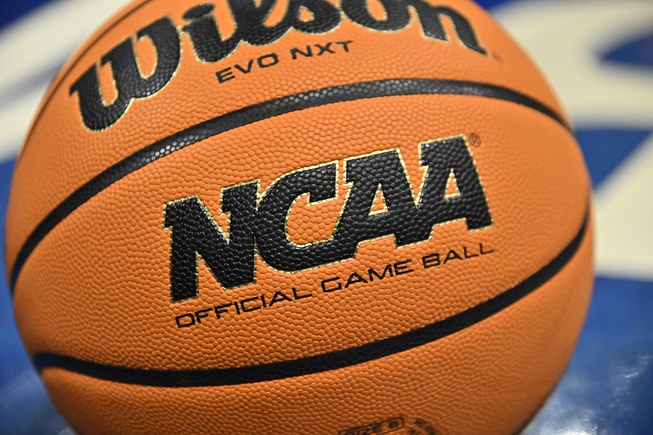
David Becker / AP
An official game ball sits on the court during the second half of an NCAA college basketball game between Southern California and UCLA in the semifinals of the Pac-12 tournament Friday, March 8, 2024, in Las Vegas.
Published Wednesday, March 27, 2024 | 10:11 a.m.
Updated Wednesday, March 27, 2024 | 12:34 p.m.
The NCAA wants states with legal wagering on sporting events to ban prop bets on college athletes.
“Sports betting issues are on the rise across the country with prop bets continuing to threaten the integrity of competition and leading to student-athletes getting harassed,” Baker said Wednesday in statement posted on social media. "The NCAA has been working with states to deal with these threats and many are responding by banning college prop bets.”
Prop bets — short for proposition bets — allow gamblers to wager on statistics a player will accumulate during a game rather than the final score.
Baker's statement came two days after the NBA confirmed it opened an investigation into unusual betting patterns surrounding props involving Toronto Raptors forward Jontay Porter. The Raptors said Porter would miss his third consecutive game Wednesday for personal reasons.
NBA players and coaches have been outspoken in the last several days about the issue of prop bets, and how gamblers react when certain numbers aren’t hit during a game. Indiana Pacers guard Tyrese Haliburton said his social media is filled with complaints and Cleveland Cavaliers coach J.B. Bickerstaff revealed he received threats from gamblers last season and reported it to the NBA.
Earlier this month, U.S. Integrity, a company used by many sports professional sports leagues and college conferences to monitor betting activity, flagged a Temple basketball game for wagering irregularities.
The NCAA already has made some progress in pushing for the elimination of prop bets on college athletes. Gaming regulators in Ohio, Vermont and Maryland have removed prop betting on college athletes online and in sportsbooks. Baker and his staff are reaching out to regulators in other states to encourage similar bans.
The NCAA is in the middle of the March Madness basketball tournaments and for the sixth straight year the number of states with legal gambling has increased, with North Carolina recently becoming the 38th. The American Gaming Association estimates $2.7 billion will be bet this year on the NCAA men’s and women’s basketball tournaments through legal sportsbooks.
Companies that monitor sports betting for irregularities have warned college sports administrators that prop betting on unpaid athletes elevates the potential risk for a scandal because players can more easily influence their own performance than the overall outcome of a game.
The NCAA conducted a survey after last year's basketball tournaments that found 58% of 18- to 22-year-olds are gambling.
Baker has said the proliferation of legal sports gambling has increased stress on college athletes.
“All that chatter about who's playing, who's not playing. Who's sore, who's not sore. What's going on with the team you're playing? What do you think your chances are? Which is just classic chatter, where — in a world where people are betting — takes on a whole new consequence,” Baker said in January before his address to membership at the NCAA convention.
The NCAA has partnered with a data science company called Signify, which also works with the NBA Players Association and WNBA, to online identify threats made to athletes during championship events that are often linked to wagering.
“Basically tracks ugly, nasty stuff, that’s being directed at people who are participating in their tournaments and we’d use it the same way,” Baker said in January. “And it can shut it down or basically block it. And in some cases even track back to where it came from.”
In October, the NCAA announced it would be advocating for state legislators to update laws to crack down on harassment of athletes, coaches and game officials and to bolster integrity protections.
In West Virginia, NCAA officials worked with lawmakers to pass a bill that would allow betting regulators to ban people from wagering in the state online or at sportsbooks if they have been found to have harassed players, coaches, or officials online or in person. The bill is awaiting a signature from Gov. Jim Justice.
San Diego State basketball coach Brian Dutcher said he is concerned about how all the negative feedback affects athletes' mental health.
“People complaining about how they’re playing, missing shots, and they just get beat up constantly,” said Dutcher, whose team is playing in the Sweet 16 in Boston this week.
San Diego State guard Desai Lopez said he's received direct messages through social media with complaints about his play.
“You know, people are betting all over the place,” he said. “So if they want to do that, that’s on their own. I don’t think it should cause stress to the players, though.”
___
AP Sports Writers Tim Reynolds in Miami and Jimmy Golen and Kyle Hightower in Boston contributed to this report.
